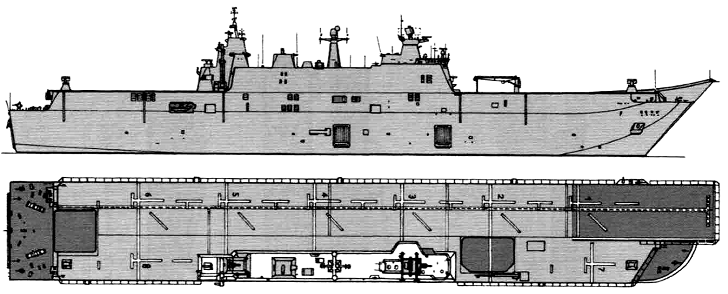
CANBERRA amphibious assault ships (2014-2015)

Canberra 2015
| Name | No | Yard No | Builder | Laid down | Launched | Comp | Fate |
| Adelaide | L01 | Navantia, Ferrol // Tenix, Melbourne | 18.2.2011 | 4.7.2012 | 4.12.2015 | in service (2019) | |
| Canberra | L02 | Navantia, Ferrol // Tenix, Melbourne | 23.9.2009 | 17.2.2011 | 28.11.2014 | in service (2019) |
|
Displacement standard, t |
|
|
Displacement full, t |
27500 |
|
Length, m |
205.7 wl 230.8 oa |
|
Breadth, m |
29.0 wl 32.0 oa |
|
Draught, m |
7.20 |
|
No of shafts |
2 Siemens azipods |
|
Machinery |
CODLAG: 1 General Electric LM-2500 gas turbine + 2 MAN - B & W 16V32/40 diesel-generators, 2 electric motors |
|
Power, h. p. |
26930 + 20260 = 29920 |
|
Max speed, kts |
20.5 |
|
Fuel, t |
diesel / gas turbine oil |
| Endurance, nm(kts) | 9000(15) |
|
Armament |
4 x 1 - 25/75 Typhoon-G Mk 25, 4 x 1 - 12.7/90, 12 helicopters (MRH90, MH-60R Seahawk, AS350BA Ecureuil) |
| Military load | 4 LCM or 2 LCAC, 100-150 vehicles (incl. MBT), 1124 troops |
|
Electronic equipment |
Sea Giraffe AMB, SRHCR Sharp Eye radars, Vampir NG e/o system, 2x Nulka decoy RL, SLQ-25 Nixie torpedo decoy, 9LV Mk 4 CCS |
|
Complement |
300 |
Project history: Largest ships yet built for Australian navy. The first stage of this project (Joint Project 2048, Phase 4B), designed to provide replacements for HMAS Kanimbla and HMAS Manoora, was approved by the Australian government in 2005. Based on the Spanish San Carlos I class Navantia design (27000t). Have an island superstructure offset to starboard on the full-length helicopter deck. Construction of the hull to the level of the flight deck, including the majority of fitting out, was undertaken at Navantia's Ferrol SY in Spain. The hulls were then shipped to BAE's Williamstown SY in Victoria for the installation of the island structure. The island modules are being constructed at a number of sites around Australia before being moved to Williamstown for final installation on the flight deck. There aree four main decks: the well deck and heavy vehicle deck for heavy vehicles and/or cargo; main accommodation deck, including the primary casualty reception facility (PCRF); hangar deck and light vehicle deck for lightweight vehicles and cargo; and the flight deck. The floodable stern well (1165m², 69.3x16.8m) accommodates four LCM(8)-sized landing craft or one LCAC plus four RIBs. Continuous hangar and light vehicle deck is located between the flight deck and the accommodation deck: the hangar (990 m²) occupies the after section of the deck, and the light vehicle deck (1880 m²) is located on the forward section of the deck. Up to 110 vehicles (including M-1A1 Abrams tanks and armored vehicles), depending on the size and configuration, can be loaded across the two vehicle decks (1880m² for light vehicles and 1410m² for tanks). Also have extensive medical facilities - 40beds hospital facility with 2 operational rooms. Flight deck measures 202.3 long and 32 wide (4750 m²) with six helicopter landing spots allowing for simultaneous takeoff and landing operations of up to four Chinook-sized helicopters. Two aircraft elevators, one 16t aft of the flight deck for larger helicopters and one forward of the island on the starboard side for medium-sized aircraft. The hangar accommodates up to 12 medium-sized helicopters; 18 medium-sized helicopters can be accommodated if the light vehicle deck is also used.
Modernizations: None.
Naval service: No significant events.
© Ivan Gogin, 2017-19